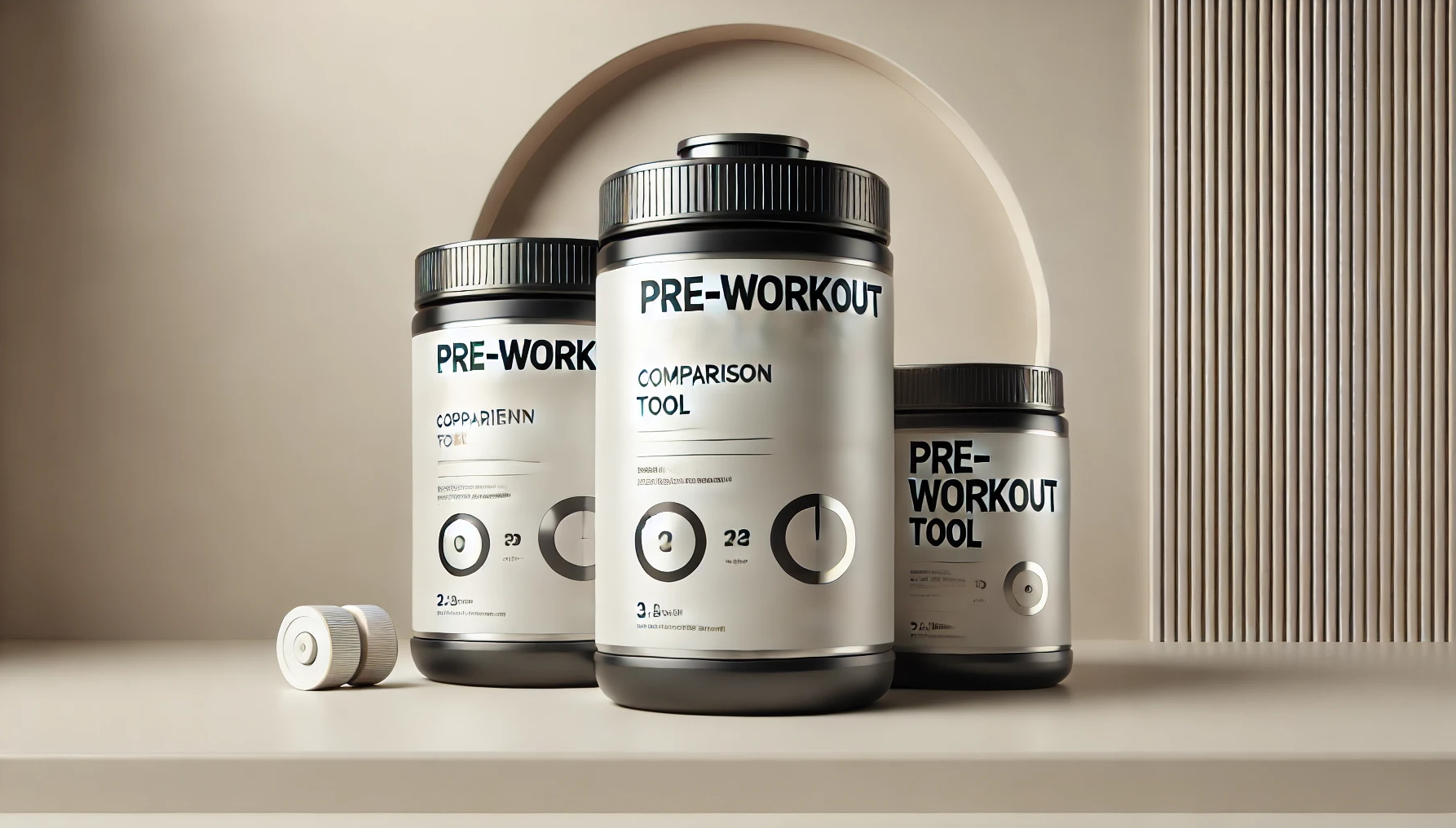






Below is a comprehensive comparison of popular pre-workout supplements.
This table provides key details like caffeine content, presence of exotic stimulants, and other performance-enhancing ingredients to help you choose the product that best suits your workout needs.
Whether you are looking for intense energy or a more balanced formula, this guide covers everything you need.
Click on any product name to go to the store, and use discount code fitfrek to save.
| Pre-Workout | Caffeine (mg) | Exotic Stims (mg) | Beta-Alanine (g) | Yohimbine (mg) | Niacin (mg) | Price | Score |
|---|---|---|---|---|---|---|---|
| Edge of Insanity | 420 | 0 | 3.2 | 9 | 0 | $1.60 | 8.2 |
| El Jefe | 525 | 0 | 4.0 | 5 | 0 | $2.75 | 8.9 |
| Dark Horse | 400 | 100mg DMHA, 100mg 1,4 DMAA | 3.2 | 2 | 0 | $1.80 | 8.6 | Gorilla Mode | 400 | 0 | 0 | 0 | 32 | $3.00 | 7.0 |
| Dexter Halloween Edition | N/A | 100mg DMHA, 100mg DMAA | 3.5 | 3 | 0 | $2.20 | 8.5 |
| Ryse Godzilla | 400 | 0 | 6.4 | 0 | 0 | $2.85 | 7.3 |
| Maniaco | 400 | 300mg DMHA, 300mg Eria Jarensis | 3.2 | 2 | 0 | $3.00 | 8.4 |
| Convict Pre Workout | 400 | 200mg DMHA | 3.2 | 3 | 15 | $1.80 | 8.4 |
| Souls 4 Sale | 400 | 200mg DMHA | 3.2 | 3 | 0 | $2.50 | 8.4 |
| WXN Labs – God Mode | 550 | 400mg DMHA, | 3.2 | 1.5 | 0 | $1.92 | 8.5 |
| Irate | 375 | 120mg DMAA | 2.5 | 2.5 | 0 | $1.92 | 8.8 |
| Wild Fire | 350 | 100mg DMAA, 200mg DMHA | 3.0 | 0 | 0 | $1.90 | 8.4 |
| Crack OG | 400 | 200mg DMHA | 3.2 | 1.5 | 0 | $3.00 | 9.0 |
| DiamondTech Aventador | 400 | 200mg DMHA | 3.0 | 0 | 60 | $1.92 | 7.8 |
| El Jefe Guerilla | 475 | 0 | 4.0 | 2 | 0 | $2.90 | 8.4 |
| BZRK Overdrive | 400 | 0 | 0 | 0 | 10.4 | $2.75 | 8.4 |
| Transparent Labs Pump | 0 | 0 | 0 | 0 | 0 | $1.67 | 8.5 |
| GGH Collab Tweak | 350 | 0 | Yes | 6.5 | 0 | $2.15 | 8.0 |
| Red Sky Powder | 400 | 300mg DMHA | 0 | 5 | 0 | $2.50 | 8.2 |
| Herolean | 500 | 225mg DMHA | 0 | 1 | 0 | $2.00 | 8.0 |
| Flame | 500 | 225mg DMHA | 3.0 | 1.5 | 0 | $2.00 | 8.0 |
| Neuphoric | 375 | 0 | 0 | 0 | 0 | $1.90 | 7.8 |
| Magico | 400 | 0 | 0 | 0 | 0 | $2.50 | 8.3 |
| Darkside Onslaught | 300 | 300mg DMHA | Yes | 0 | 0 | $2.50 | 8.5 |
| Bulk Black | 300 | 0 | 4.0 | 0 | 0 | $1.83 | 8.5 |
| Sharp ER | 400 | 225mg DMBA | Yes | 6 | 0 | $1.67 | 8.0 |
| Firestorm | Yes | 50mg DMAA, 120mg DMHA | 3.0 | 2.5 | 50 | $2.00 | 8.5 |
| Mesomorph | Yes | DMAA, DMHA | Yes | Yes | 0 | $1.60 | 7.5 |
| 1.M.R. OG | 250 | DMAA, DMHA | Yes | Yes | 0 | $1.72 | 7.5 |
| Excelsior | Yes | DMHA | 0 | 0 | 0 | $3.83 | 8.4 |
| Killer Instinct | 435 | 125mg DMAA | 4.0 | 0 | 0 | $2.00 | 7.7 |
| Demolish | 350 | 200mg DMBA, 100mg DMHA | 3.2 | 2.5 | 0 | $1.60 | 8.0 |
| Smack v2 | 300 | 0 | 3.2 | 0 | 0 | $2.50 | 8.3 |
| Juiced | 400 | 200mg DMHA | 3.2 | 0 | 0 | $2.50 | 8.0 |
| Cannibal Ferox Amped | 550 | 400mg DMHA | 3.2 | 5 | 0 | $3.50 | 8.0 |
| Zeus | 400 | 200mg DMHA | 3.2 | 0 | 0 | $2.50 | 8.7 |
| Crack | 400 | 120mg DMAA | 3.2 | 2.5 | 0 | $3.00 | 9.0 |
| Doomsday Hardcore | Yes | DMHA | 0 | 0 | 0 | $2.03 | 8.5 |
| Chaotic Rage | 400 | 250mg DMHA | 3.5 | 2 | 0 | $1.33 | 8.0 |
| Crack Barbarian | 525 | 250mg DMHA | 3.2 | 1.75 | 0 | $2.80 | 8.5 |
| Crack Primal | 675 | 250mg DMHA | 3.2 | 1.75 | 0 | $2.40 | 8.8 |
| Crack Gold | 500 | 100mg DMAA, 200mg DMHA | 2.0 | 1 | 0 | $3.20 | 8.5 |
| Amp3d | Yes | DMHA | 3.2 | Yes | 0 | $2.00 | 8.0 |
| Ryse Loaded Pre | 300 | 0 | 3.5 | 0 | 0 | $2.00 | 7.8 |
| Wrecked | 350 | 0 | 3.5 | 1 | 0 | $2.50 | 8.5 |
| Hypermax'd Out | 500 | 0 | 3.2 | 15 | 0 | $2.75 | 8.5 |
| Legit Pre | 400 | 150mg DMHA, 75mg DMAA | 3.2 | 1 | 0 | $2.00 | 8.8 |
| Jack3d | 405 | DMAA, DMHA | Yes | Yes | 0 | $2.53 | 7.5 |
| Mamba | Yes | DMAA, DMHA | 3.0 | Yes | 50 | $1.67 | 8.0 |
Note: Exotic stimulants like DMAA and DMHA are powerful but may have side effects.
Always consider your tolerance and consult with a healthcare professional if you’re unsure about the right pre-workout for you.
You can sort the table by different columns to compare products based on your preferences.
If you're interested in exploring the strongest pre-workouts available, check out our article on the strongest pre-workouts.
For more information on DMAA and its effects, see our detailed guide on DMAA supplements.
The overall score for each pre-workout is based on several key factors.
Each factor is rated out of 10 and combined to provide a final score.
Here’s the breakdown of how the scores are determined:
Caffeine strength (out of 10):
Exotic stimulants (out of 10):
Pump and endurance support (out of 10):
Focus and cognitive support (out of 10):
Side effects and crash (out of 10):
Price-to-performance ratio (out of 10):
As part of the scoring process, I also adjust certain scores based on my own experience and judgment of how the product performs in real-world settings. These personalized adjustments ensure that each pre-workout gets a fair evaluation, reflecting not just the label ingredients but how they actually deliver results during workouts.
While factors like caffeine strength, stimulant blend, and pump support are critical, my personal testing also plays a role in how the final score is determined. This personalized approach adds a unique touch to the ratings and helps you find the pre-workout that best fits your goals.
The final score is an average of these factors, with some weight given to caffeine strength, exotic stimulants, and pump/endurance since these are the most critical components for many users.
For example:
This method ensures that the score reflects both the potency and real-world user experience of each pre-workout.



Useful Links
 About FitFrek
About FitFrekFitFrek operates as an independent platform, offering comprehensive workouts, programs, routines, guides, and unbiased reviews to accelerate your progress. We pride ourselves on our honesty, delivering straightforward and candid insights. FitFrek does not offer medical advice, diagnosis, or treatment services.